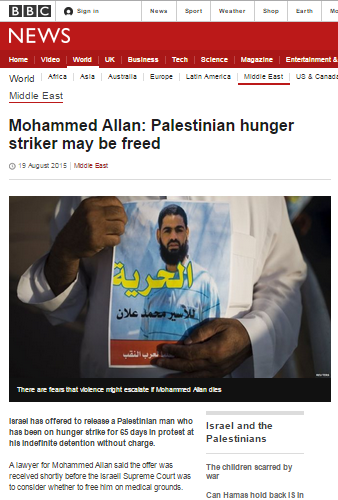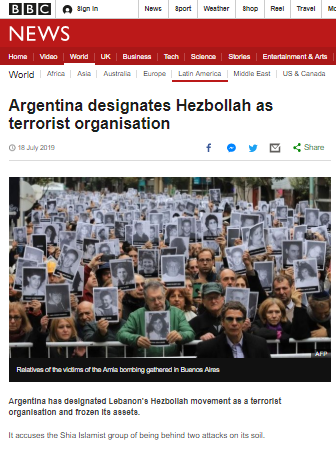As previously noted here, an article which appeared on the BBC News website on August 14th described Mohamed Allan as “an alleged activist for the Islamic Jihad militant group” [emphasis added].
A follow-up article published on the BBC News website on August 19th under the title “Mohammed Allan: Palestinian hunger striker may be freed” included this passage:
“Mr Allan, a lawyer and member of the militant group Islamic Jihad, lost consciousness and was placed on a respirator on Friday after his lungs stopped working and he had seizures.” [emphasis added]
Whilst it would have been more informative for audiences had the Palestinian Islamic Jihad been described in more accurate terms as an Iranian backed terror organisation, at least the BBC appeared to have amended its previous inaccuracy.
Some seven hours later, that article was replaced by another one – this time titled “Israel suspends Palestinian hunger striker’s detention“. The first two versions of that article used the following terminology:
“Mr Allan, a lawyer and member of the militant group Islamic Jihad, began refusing food in June in protest at his indefinite administrative detention.”
And:
Mohammed Allan, a lawyer and member of the militant group Islamic Jihad, began refusing food in June in protest at his indefinite administrative detention.”
Curiously however, the third version of the report reverted to the inaccurate language used in the August 14th article:
“Mohammed Allan, an alleged member of the militant group Islamic Jihad, began refusing food in June in protest at his indefinite administrative detention.” [emphasis added]
The following statements were also added:
“The Israeli justice ministry has alleged that Mr Allan is involved in “grave terrorism”. It says that “classified information” warrants keeping him detained.
Mr Allan denies the allegations and any involvement with Islamic Jihad.”
BBC Watch has been advised by official sources that:
“He [Allan] is a Palestinian Islamic Jihad operative. He was first arrested in 2006 after recruiting a suicide bomber. He was tried and served a sentence of 35 months.
He was arrested in administrative detention in 2014 following substantial and grave intelligence that he was in contact with PIJ operatives that intended in carrying out severe attacks. On July 20 2015 the Supreme Court confirmed and approved his detention.”
Both these August 19th BBC reports concerning Mohammed Allan include the following superficial description of the process of administrative detention, which is of course used in many countries around the world, including the United Kingdom, Ireland, the United States and Australia.
“Mr Allan began the hunger strike on 16 June in protest against his incarceration since November 2014 under what Israel calls administrative detention.
The system allows a military court to order suspects to be detained indefinitely, subject to renewal every six months by the court, without charge or trial.”
Clearly that portrayal does not adequately inform BBC audiences of the very specific circumstances in which the procedure is used or the safeguards in place.
“…a Military Commander (namely, a high-ranking IDF officer with specific authority) may order the administrative detention of a person if there are reasonable grounds to consider that taking such a measure is necessary for imperative reasons of security.
Such an order must rely on credible, current and reliable information, as detailed as possible, showing that the person poses a specific and concrete threat of a substantial nature to the security of the West Bank or its population.
Administrative detention is used solely as a preventive measure and only as a last resort, and cannot be employed where criminal prosecution is possible or less restrictive administrative procedures would adequately contend with the security risk posed by the individual.
The procedure for issuing orders for administrative detention includes several safeguards against both abuse and arbitrariness:
First, prior to the issue of a detention order, an independent military prosecutor provides a legal review through conducting an assessment of the order that is legally binding on the Military Commander.
Second, once a detention order has been issued, it is subject to a multi-layered system of judicial review by the Military Courts in the West Bank. Detainees wishing to challenge detention orders may also file a petition with Israel’s Supreme Court sitting as the High Court of Justice. Detainees have the right to legal counsel of their choice throughout this process.
Administrative detention orders mostly rely on sensitive and classified information gained from intelligence sources. Due to its confidential nature, this information cannot be disclosed in full to the detainee or their attorney so as not to endanger the safety of the source or frustrate future intelligence gathering abilities. In these cases, detainees are provided with the general reasons for their detention.
Administrative detention may be ordered for a period of no more than six months. Following this period, a renewed detention order may only be issued on the basis of an updated assessment of the threat posed by the person, which establishes that continued detention is required to confront the threat posed by that person. Any renewed detention order is subject to the same avenues of review and appeal as an initial order.”
The earlier article also includes the following statement:
“Mr Allan’s hunger strike has continued despite Israel’s parliament passing a law last month, which doctors strongly opposed, that would allow the authorities to force-feed detainees to keep them alive.”
The link provided is to a BBC report from July 30th titled “Israel passes law allowing force-feeding of prisoners” in which the term “force-feeding” is used an additional three times. The accepted meaning of that term obviously implies to readers that detainees would be “force-fed” food by means of an orogastric or nasogastric tube. As the MFA explains, that is not the case.
“While the amendment‘s goal is to save lives, attempts are currently being made to misrepresent it. Opponents to the law are attempting to portray it as being equivalent to forced feeding through a feeding tube administered without pain killing measures. This is not the case. The life-saving treatments available under the law include regular medical procedures such as the intravenous administration of total parenteral nutrition (TPN), widely used for patients – including children – who cannot consume a diet in the regular manner.
Previously existing legislation also gives physicians the right to consider other necessary medical procedures, such as performing blood and urine tests and dispensing medications and salts.
Any treatment or test must be done in a manner consistent with a doctor’s ethical obligations, including the proper use of pain management methods. The law does not instruct doctors what to do – any treatment is subject to the medical and ethical judgement of the treating physician. What it does do is give the medical community the authority to save the lives of hunger strikers. A similar authority traditionally exists in the case of individuals who want to commit suicide or who suffer from diseases such as anorexia, and who reach a life-threatening condition.”
Clearly the BBC’s framing of this topic does not meet its obligation to report fully, accurately and impartially.




